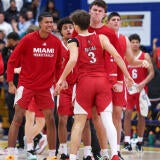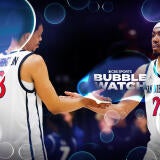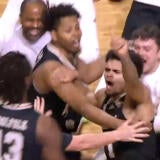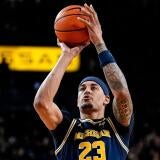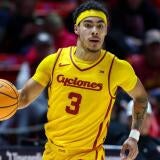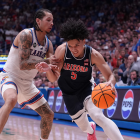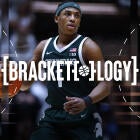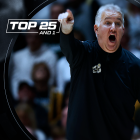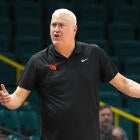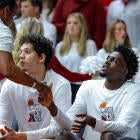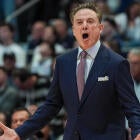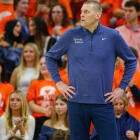Stock Watch: Winners and losers of the 2016 NBA Draft Combine
The combine probably gets a bit inflated in terms of its importance around the NBA. However, here are the players who helped and hurt themselves at the event
CHICAGO -- The post-NBA Draft Combine period is a time filled with overreaction, misinformation and focus on things away from the floor.
The combine is great because teams can meet prospects, learn their medical backgrounds and find out just how big and athletic they are.
(Well, maybe. We'll get to that in a second.)
However, we need to follow a couple of rules when reacting to what's going on around the league at this very volatile time.
1. Do not overreact to empirical measures of the combine
As I said in my preview, NBA teams look through athletic test results but neither pore over them nor make high-level decisions based because of them. They like measurements to see if they better explain tape (for instance, does a guy struggle to finish at the rim? A short wingspan could explain that), or if there could be room for improvement. They do not drastically alter thoughts of scouts and executives.
And this year, there is significant concern among teams about accuracy of measurements. The standing reach measurements seemed to be quite wrong, given the information in the DraftExpress database from past events. That trickles down to the vertical jump measurements, as verticals are taken by subtracting the highest point of a player's jump from a player's standing reach. For instance, Demetrius Jackson, who posted a 43.5-inch vertical leap, good for second at the combine, had been measured in the past at Hoop Summit in 2013 at an 8-foot standing reach. This time around, Jackson had a 7-foot-9 standing reach despite measuring taller and with longer arms at the combine than at Hoop Summit. It seems quite likely that his standing reach was underreported, inflating his vertical measurement.
Scouts also temper reactions to the 5-on-5 games. First, it's two games, and it's never a great idea to make decisions based on small samples that size. Second, the word "game" is a pretty loose descriptor. It's a glorified high-level scrimmage among teams that have little chemistry. In cases of guys like Cheick Diallo, it gives scouts another look at a guy who didn't play a ton last season. But for players like Robert Carter, Chinanu Onuaku, scouts and executives have good feels for their games. Either way, things probably aren't drastically changing in terms of a player's stock.
2. Be careful with the information that's out there because of hidden agendas
The combine is beneficial for most non-players in attendance because it allows for a more free exchange of information than normal. However, people need to understand that the information that's being put out there is often biased. Teams are careful about what they say on or off the record. Agents are always biased toward their clients.
In particular, a confluence of events make gathering accurate information even more difficult. The top two picks are relatively clear, but then there are three clusters of talent. Nos. 3 through 12 are quite volatilet. Then, there's a tier from No. 13 to No. 25 or so. After that, it's a huge group from the bottom of the first round all the way through No. 60 or so. That's mean there will be quite a bit of misinformation out there as teams figure out their favorites. Because this is a weaker draft, there's little in the way of a consensus pecking order beyond very loose tiers.
Winners and Losers
It's still worth noting players who helped themselves -- however marginally -- and players who could have performed better. Again, for the winners, we're generally talking about a bump in ranking that isn't particularly big, but can be the difference between a first- and second-round pick.
WINNERS
Cheick Diallo | C | Kansas
Diallo started the combine by throwing up terrific measurements at 6-foot-9 with a 7-foot-4-plus wingspan. He followed with strong performances in both 5-on-5 games, standing out because of his athleticism, ability to run the floor, defense and motor.
This combine was arguably more important for Diallo than anyone. He needed to remind scouts about what they liked when he was rated coming into the season as a potential top 15 pick before falling into a rut in Kansas. Mission accomplished for the big man from Mali, who is off to the NBA for good after deciding to stay in the draft. Here are some more complete thoughts on Diallo.
DeAndre Bembry | SF | Saint Joseph's
Playing 5 on 5 was not necessary for Bembry. Like many other first-round-rated players, he could have done measurements, athletic testing and interviews. However, the 6-6 wing played, and -- much like Terry Rozier last year -- helped himself. Bembry was the best player on the court Thursday, showing diverse skills in passing, ball-handling and scoring inside the 3-point line.
The 21-year-old doesn't have much to worry about regarding his stock. He fits with a lot of teams in the 18 to 30 range, and just needs to continue working out and interviewing well to likely secure a place in the first round.
Jaron Blossomgame | SF | Clemson
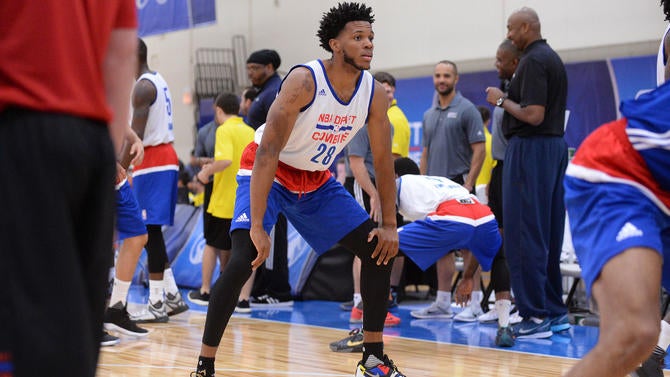
Blossomgame still hasn't made a decision about staying in the draft. He'll make that decision with improved stock after the event, which gives him leverage every potential pick would love.
The 6-7 forward showed off superb athleticism and solid size in athletic testing, then played well in the 5-on-5. On Friday, he showed off the improved shooting by knocking down three early 3-pointers and applied athleticism he showed in testing.
Blossomgame said he is planning to go down to the wire with his call, as he has a workout with the Suns on May 24. He said that if he gets indications his stock is in the No. 25 to 40 range, he'll probably give it a shot. If it's more near the end of the second round, he'll return to Clemson. NBA teams consider him to be right in the middle of those ranges, so he's going to have a tough call over the next few days.
Michael Gbinije | SG | Syracuse
The Syracuse senior was quite solid. He measured well at 6-foot-7, then played well in games, seeing time at the point and wing while defending different types, too. Gbinije has always been a solid defender in the framework of Syracuse's zone, but transitioning to a man-to-man scheme can always be a bit rough for Cuse players. He showed ability to man up in this setting, and that will help.
Gbinije's sweet spot is likely somewhere in the second round. At nearly 24 years old there's a slight perception of a lack of upside. Still, there aren't many players in that range who can handle the ball, create for others, shoot from distance and have potential defensively. His well-rounded skill set and positional versatility are exactly what teams are looking for in the pace and space era.
Kay Felder | PG | Oakland
Felder tied the record for max vertical leap at the combine this week at 44 inches, despite skepticism about the veracity of those marks this year. Still, being anywhere near that mark shows what kind of explosive athlete we'll see in Felder.
"I just looked up at the thing and said 'go get it,'" Felder said of his leap. "I just thought if I'm going to be here, why not leave with your name on the tip of people's mouths."
That athleticism showed up on both ends in the 5-on-5 session, where the biggest revelation was his ability to defend. Felder harassed guys like Melo Trimble and Cat Barber into turnovers. Occasionally at Oakland -- because of his role offensively -- Felder didn't play with a ton of effort on defense, and it's his biggest hurdle in carving out an NBA role. His size will always be a hindrance in switching onto larger players, but he's powerfully built and he showed he can be a weapon on that end.
Offensively, Felder also played well, showing burst to get to the rim whenever he wanted and a terrific mid-range pull-up game -- essential at his size. His pick-and-roll instincts are great too, and he should be able to create for teammates at the next level. I don't believe he'll necessarily be a first-round pick, but Felder definitely helped himself.
Joel Bolomboy | PF | Weber State
Bolomboy opened eyes in athletic testing, scoring a 40.5-inch vertical leap, the top lane agility score and one of the top sprint scores. Compared to size, there is likely no one who did better athletically this week than the big man who came in at 6-9, nearly 225 pounds. Again, while NBA teams don't necessarily go crazy over that stuff, it certainly will get him a closer look.
Bolomboy was OK in the games, showing the ability to hit shots from distance as well as control the glass. His instincts and basketball sense remain raw. He's not the quickest decision maker with the ball, and seems to lack some rotation awareness on defense. Bolomboy still likely walked out of this event with slightly more looks from teams because of that athleticism.
LOSERS
Caris LeVert | SG | Michigan
LeVert did not play, only interviewed for teams and media. However, during those interviews, he revealed he is still four weeks away from being able to do any on-court work. LeVert's foot problems have been well-chronicled, and it seems likely they will be flagged by the league during medical testing, should he through it.
That's a real shame, because on skill alone LeVert is almost assuredly a first-round pick because of his size, shooting ability and ball skill. We'll see what happens once the medicals come back, but it's hard to imagine LeVert sneaking into the first if he can't work out. Now, the question shifts as to whether a team will take a chance on him to see if he can get past injuries.
Daniel Hamilton | SG | Connecticut
Hamilton has hired an agent, which means he's in the draft. You have to wonder if he'll regret that decision, after he was one of the worst players in the 5-on-5 session and one of the worst athletes in testing. Hamilton only had a 29-inch vertical leap as well as some of the worst agility scores for a perimeter player. In the game, those things came to a head as he couldn't blow by anyone or create his own offense. Add relatively poor shooting and lackluster defense, and it's hard to see how he gets drafted at this point.
Marcus Lee | PF | Kentucky
Lee was one of the more surprising invites -- ranking at No. 111 on the CBS Sports Big Board -- and he did little to change that. He did not test as well athletically as anticipated, and really struggled in game settings. Not only was he ineffectual defensively, but he didn't play within his skill set offensively and tried to do too much.
Like Isaiah Briscoe, Lee is in a really tough spot right now. He needs to either return to Kentucky, where he has been recruited over in some ways, or go pro and hope for the best in the D-League while continuing to improve his game.
Troy Williams | SF | Indiana
Instead of trying to show scouts he can play within an offense and make good decisions, Williams was his wildly unpredictable self. He was out on the floor chucking shots with abandon, not particularly looking for teammates and generally tried to do too much. He also didn't test at the elite level athletically many around the league anticipated and has relatively short arms.
There's definitely a player within his package of skills but he must get his more wild tendencies under control. But right now, it's tough to see a team investing a draft pick in him.
Dedric Lawson | PF | Memphis
Lawson put up the worst vertical score, the worst sprint score, the worst shuttle score and the second-worst lane agility score. In the games, Lawson was highly ineffectual, struggling to do anything at even a marginal level. He didn't rebound all that well, he couldn't create anything on offense and his jump shot wasn't falling.
The good news is he can return to school, play for Tubby Smith at Memphis, likely improve his game and give it a shot next year. After all, he was among the youngest players in attendance at 18. But it's tough to see him getting a shot based on what teams saw at this combine.
QUICK HITTERS
Miami guard Sheldon McClellan had a really solid week after being the last player invited. He was only there after Wayne Selden was forced to miss action because of an injury, and he took advantage. McClellan posted terrific athletic measurements as expected, then played well in the 5-on-5 portion. Unfortunately, he was unable to schedule any interviews with teams because of his late arrival. I asked if it bothered him that he was unable to meet with NBA teams.
"It was kind of weird," McClellan said. "But I got the extra sleep in, because I didn't have to get up as early and I was well-rested for the game today, so I took some types of positives from it."
***
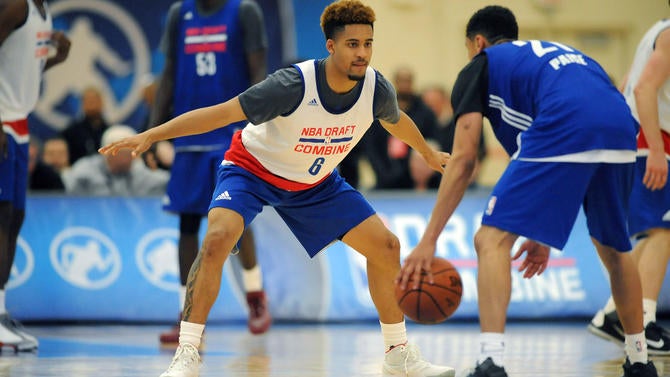
Maryland point guard Melo Trimble didn't have the best week, generally looking like the same out-of-sorts player we saw late last season. He says he is genuinely torn regarding whether he'll return to Maryland for his junior season. If he does return though, he'll team with Internet celebrities Jaylen Brantley and Jared Nickens, who have become famous because of their association with the "Running Man Challenge." Trimble himself has been in a couple of videos, and joked that he's glad that the craze around his teammates is dying down a bit.
"I just don't want them to get too big with it," Trimble said with a big smile. "They gotta understand that they're still basketball players."
Trimble also made a couple of jokes at his own expense about this experience in the videos.
"I mean, I can't dance," Trimble said laughing. "The two videos I was in somehow ended up being the best videos, too, so I don't know what happened. I was just doing me, or at least the best I could do."
***
I wrote about how underclassmen at the combine really appreciate the new early entry rules on Friday. Overall, the players are quite pleased with the process. One thing that didn't make the cut for that story though was when I asked Wisconsin forward Nigel Hayes about the role of agents within the process. Specifically, I asked if he felt agents should have some sort of role in the process in order to help the players out. Always somewhat vocal about amateurism questions, here's how Hayes responded.
"I would say so," Hayes said. "Maybe there are rules. Maybe you can talk to people. I don't know, I'm not really 100 percent sure. But if that is a rule that you can't, I think it wouldn't hurt to have someone who knows more about the situation than you do who can give you an eye. Not necessarily that they're giving you something in return or you're paying them, but being able to have a medium between yourself and college and the NBA I think would definitely help players."
***
Florida State guard Malik Beasley has kind of an interesting background. His family has been in the acting business for years. His mother Deena was in The Hunger Games. His father Michael was in Flight, the Denzel Washington movie, and appears in Netflix shows Bloodline and House of Cards. His grandfather, John, has over 50 credits on IMDB. Malik will definitely get his chance in front of the camera, but it'll be on the basketball floor instead of on a stage.
"Them being in the acting business helped me a lot," Beasley said. "They taught me how to deal with success and how to keep managing. It was pretty cool though watching them while growing up."


